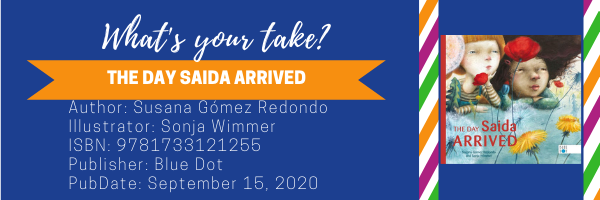Janine Schall, University of Texas Rio Grande Valley, Edinburg, TX, and Jeanne Fain, Lipscomb University, Nashville, TN
This month in My Take/Your Take, Janine Schall and Jeanne Fain focus their discussions on the picture book The Day Saida Arrived by Susana Gómez Redondo and Sonja Wimmer, translated from the original Spanish by Lawrence Schimel. Along the way we’ll highlight related books.
In our third installment, Janine and Jeanne talk about how language is used in the book.
JANINE: The Day Saida Arrived shows two young girls learning each other’s language—the narrator is learning Arabic from Saida and Saida is learning English from the narrator (of course, this would have been Spanish in the original version of the book). One of the things that really struck me is the way language is treated as an object that is separate from the person. The narrator says that Saida has “lost all her words” and the narrator tries to find them by looking in all sorts of places, but “I didn’t find even a trace of Saida’s words.”
JEANNE: I noticed that also.
JANINE: I see language as far more integral to identity—it isn’t something that people have or don’t have, but a foundational part of who we are. I love the way that Yuyi Morales approaches language in Dreamers, where it’s deeply intertwined with culture and identity.
JEANNE: Saida may feel that her words are lost because the words that she knows are not counted in her new context. I do love how she continually interacts with the narrator about language. They essentially are trying out language together and learning from each other.
JANINE: Yes, I agree! The story is a great depiction of language learning.
JEANNE: I appreciate how Saida and her friend learn new words together. They are creating a shared space as they navigate language learning. They take time to learn how to pronounce the names of words by writing them on the blackboard. They repeat the words “so that the sounds would become rooted in her memory and on her lips.”
JANINE: I made a lot of connections to my own experiences trying to learn Spanish when I was younger!
By the end of the book Saida is able to communicate in English and, “…every morning Saida uncovers her voice and her laughter…” It’s then that we learn through the illustrations that saida means happy in Arabic. I love that little touch about her name. And I also appreciate that we are shown how to pronounce it correctly.
JEANNE: The mispronunciation of names is something that I have experience with in my personal life. Since my name is pronounced Jean-knee and no one gets it right, I explain the pronunciation of my name on a daily basis. Or sometimes, I just go through the day with my name being pronounced Gee-Anne because I do not have the mental space to correct the person that is butchering my name. I imagine that Saida would have to explain her name in many of today’s classrooms in the United States because it’s a newer name for us and less common.
JANINE: In my region of the country, Saida, or more often Zaida, is a fairly common Mexican-American name.
JEANNE: This makes me think about two other books that I appreciate greatly. Alma by Juana Martinez-Neal and Your Name is a Song written by Jamilah Thompkins-Bigelow and illustrated by Luisa Uribe are two books that focus upon the historical background of names and the importance of understanding the pronunciation of names. Both books show how language matters and the impact that language has on one’s identity if the language is not honored in a way that makes sense.
Other Children’s Literature Cited
Martinez-Neal, J. (2018). Alma and how she got her name. Candlewick.
Morales, Y. (2018). Dreamers. Holiday House.
Thompkins-Bigelow, J. (2020). Your name is a song. Innovation Press.
Title: The Day Saida Arrived
Author: Susana Gómez Redondo
Illustrator: Sonja Wimmer
Translator: Lawrence Schimel
ISBN: 978-1733121255
Publisher: Blue Dot
PubDate: 2020 (English edition)
Throughout May 2021, Janine Schall and Jeanne Fain discuss different aspects of The Day Saida Arrived. Check back each Wednesday to follow the conversation!
- Themes: Day Saida Arrived, Janine Schall, Jeanne Fain, Sonja Wimmer, Susana Gómez Redondo
- Descriptors: Books & Resources, My Take/Your Take

